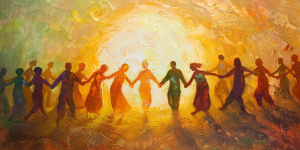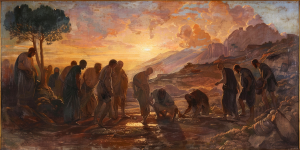This article was originally published by North Star
Following the release of David Archuleta’s new song “Hell Together,” inspired by a heartfelt message from his mother expressing that she would prefer to endure hell with him rather than see him in a place devoid of love and acceptance, the response within the Latter-day Saint diaspora has varied widely. The spectrum of reactions has ranged from expressions of celebration to offense. Archuleta’s song poignantly sheds light on the emotional turmoil often experienced not only by sexual or gender minorities within The Church of Jesus Christ of Latter-day Saints but also by their families and loved ones.
I’ve had a number of my own thoughts and reactions, ranging from deep empathy to profound sadness. Central to those thoughts is a conviction—despite never having met David or his sweet and loyal mother—that despite what you’re feeling right now, I look forward to rejoicing together in heavenly glory.
To David, Lupe, and everyone navigating the complex intersections of faith, sexuality, identity, and familial bonds, I want to affirm my belief in an infinitely good and loving God who didn’t send us here to fail.
Earth is a classroom, not a courtroom. Latter-day Saints believe in Heavenly Parents who delight in our growth and progression, not in alienation or punishment. God works tirelessly with us, wherever we are, offering infinite opportunities for us to turn towards Him and receive His blessings.
It’s worth pointing out that Latter-day Saints don’t believe in a traditional Christian concept of hell, something hardly apparent or acknowledged in many discussions about this new song.
I have also known and worked with so many who have distanced themselves from God or the Church for as long as 20 or 30 years or more who have since returned to the Church, many of whom have some of the strongest testimonies of the restored gospel and its associated doctrines regarding gender, sexuality, and marriage of anyone I know. Earth is a classroom, not a courtroom.
When I think of those still distanced from God, I cannot help but have absolute faith in a loving and merciful Parent who won’t stop working with us and loving us. God is “in it to win it” with us, regardless of where we may presently be in our individual journeys. The prophet Joseph Smith taught that God will find a way to “ferret out every soul,” and He is really good at what He does. Where we are now is just one snapshot in a larger eternal journey.
It was 20 years ago this year that I publicly shared some early reflections on my own journey toward reconciling my sexuality with my faith. David is not alone in traversing the often complex terrain between sexuality and spiritual beliefs, whether those journeys are navigated privately or in the public eye. For those who seek to explore these intersections while holding onto their belief in the restored gospel of Jesus Christ, I wish to offer some personal insights that have been instrumental to my peace and fulfillment, reflecting patterns I’ve observed in others who have found similar solace within the Church, with the hope that they might be helpful to others who may presently be struggling in that journey.
Although our journeys through this landscape may vary in myriad ways, I want to share my firm belief that hope and joy are attainable through the restored gospel of Jesus Christ, even if that presently seems impossible. Abraham “against hope believed in hope” and “was strong in faith, giving glory to God” (Romans 4:18,20). I am convinced that such hope and peace, even if hard-won, is both possible and deeply rewarding.
Lessons Learned
Across these different journeys I’ve witnessed in my 20 years of ministry and observation, even though no one is the same, I’ve noticed some patterns among those who get to a really good, healthy place around this in a way that is in harmony with the gospel.
With there being such a “war of words and tumult of opinions,” it can be soul-stretching to navigate these intersections between deep parts of ourselves. This journey can be fraught with challenges, often exacerbated by conflicting narratives that can lead to feelings of isolation and despair.
This is a path that demands, as a Latter-day Saint community, our utmost compassion and understanding, acknowledging that for some, the reconciliation of faith and identity is experienced, especially at first, as an ongoing source of inner conflict.
In my experience, the journey of growth and progress is a gradual process of development, self-awareness, and evolving personal identity that can be guided and channeled beautifully, even if messy at times, within an overarching spiritual framework. However, this journey demands greater patience, time, and a readiness to place our trust in God and the expansive cosmic design—requirements that often exceed the patience of prevailing cultural narratives about gender and sexuality.
A Hopeful Story
Humans are “narrative” creatures; that is, we understand ourselves and the world through stories. In order to thrive, we need a positive and life-giving story for our lives. Ultimately, it’s important to understand that our experiences in life have divine purpose and design. There is not a single experience any of us can have that puts us outside of the plan of salvation and exaltation. Not one. Each of us has a “customized curriculum” of mortality, as Elder Neal A. Maxwell poignantly described, designed for our personal growth and spiritual development.
I personally believe that we had quite a bit of say in what our mortal experiences would look like. I believe that we all knew exactly what we were getting into. President Joseph Fielding Smith taught that the Savior “no doubt possessed a foreknowledge of all the vicissitudes through which He would have to pass in the mortal tabernacle … If Christ knew beforehand, so did we.” Our experiences in life have divine purpose and design.
Many people of faith understand that there’s a broader eternal story playing than the one we can see right now, one that gives meaning and purpose to our experiences. This insight can be very healing and empowering.
At one point several years ago, the Spirit communicated to me that I knew before I was born that this would be part of my mortal experience and that it would be tied to my mortal mission. That helped reshape the way I viewed this toward a kind of stewardship that I am called to consecrate toward the building of Zion, rather than as a “problem” that would prevent me from fulfilling God’s plan for me. There was great spiritual power in that shift in perspective—a shift in how I viewed the story of my life. Many sexual and gender minorities are drawn to popular cultural stories regarding “who we are” or what these experiences mean for us because they provide some sense of meaning or positive identity, but so many of those narratives plainly betray the gospel of Jesus Christ.
But the story of eternity that we understand in the fullness of the gospel, when we really understand and internalize it, is even more profound and empowering than what any western cultural movements can offer. President Brigham Young taught that “the people do not…have [the]…full vision before their minds, [for] if they did I will tell you, plainly and in honesty, that there is not a trial which the Saints are called to pass through that they would not realize and acknowledge to be their greatest blessing.”

Lessons in Love
Every single one of our experiences, including sexual and gender minority experiences, is designed to teach us something about what it means to love more fully—love God, one another, and ourselves. While there is divine purpose and design in the mortal experiences of sexual and gender minorities, those experiences don’t put us outside of the covenant commitments God invites us into that represent a central part of an eternal curriculum leading us into the divine nature. Orientation becomes irrelevant as it’s swallowed up in perfect love.
If we do this, not only will those experiences not hinder us from becoming like God, but they will actually become one of the very catalysts of growth that help us to become as our Heavenly Parents are.
Our God is a God who can hold an infinite capacity for loyalty to truth and loyalty to love, far beyond what we mortals can. That means we have to wrestle here with what may often seem to be competing values when, in the infinite scheme of things, there is no competition at all—only oneness and infinite wholeness.
As the Prophet Joseph Smith taught, just as God is “more ready to detect every false way, than we are apt to suppose Him to be,” He is also, at the same time, “more liberal in His views, and boundless in His mercies and blessings, than we are ready to believe or receive.”
Furthermore, as God has blessed me with spiritual experiences to glimpse the quality of eternal love He is calling us into, I believe the entire cultural conversation about love, including around sexual minority questions and whether sexual minorities “should be allowed to love whomever they love,” is—in the eternal scheme of things—entirely misguided and hollow.
Bumper sticker platitudes like “All love is love” and “You can’t choose whom you love,” on one hand, or cursory comments that “same-sex attraction isn’t a sin as long as you don’t act on it” ring shallow in light of the boundless love that God is calling us into. That love—so many don’t realize—is a spiritual gift that subsumes any and every kind of love we can experience in this life.
Not all that we call love is actually love. But true love, true charity, does love all. Said differently, I believe that the love we will all feel for and with one another in the Celestial glory is more powerful and more transcendent than any love we can experience in this world, including in the best of earthly marital relationships. The Celestial “fulness” that God embodies simply can’t be experienced in a Telestial world.
The quality of relationship that the Prophet Joseph witnessed in his vision of the Celestial glory, where we “see as [we] are seen, and know as [we] are known” (D&C 76:94), is our heavenly birthright. This quality of true intimacy in the gospel of Christ, and among the whole of God’s family, is something I believe He is calling us to practice now―not just wait to experience in the hereafter. In order to do that, we have to disentangle the principle of deep and meaningful human intimacy from its euphemistic association with sex or even romance. I believe we conflate these concepts at great spiritual cost.
As we seek to create a Zion that is more reflective of its heavenly manifestation, we must ask ourselves how we can create a space here and now where all people can experience deeper love, intimacy, belonging, and spiritual family. It seems to me that this should be one of our prime focuses in the Church. And with Church leaders recently noting that more than half of all adults in the Church are single, and with an increasing epidemic of loneliness in our Western culture, it’s more important now than ever before.
Concerning the narrative that for sexual minorities, the most “authentic” love is that pursued in same-sex relationships, I believe there’s not a single gay or lesbian couple—even of the most loving and connected and committed of all gay or lesbian couples—who love each other more than God loves all of us or more than we will all love each other in the Celestial world.
While it may sound odd or foreign in our present culture to articulate it this way, there’s a sense, if we’re talking about our capacity to truly love and connect and experience deep intimacy with others of the same sex, all “straight” men and women will, in that heavenly glory, love others of the same sex more than any “gay” or “lesbian” individuals ever can or will in this world. And equally so, all “gay” or “lesbian” men and women will have a greater capacity for love, connection, and intimacy with others of the opposite sex more than any “straight” individuals ever can or will in this world.
So, the Christian call for sexual minorities isn’t to love less or some trite restriction that we aren’t allowed to “love whom we love” or “be who we really are”—it’s a call to love more. Same-sex love and intimacy in their truest, Celestial manifestation are beautiful and good, even as disciples of Jesus Christ are called to channel and cultivate that love within the moral bounds He has set.
This kind of pure, exalting love actually is a choice, but more than that, it’s a divine, spiritual gift we can choose to receive and cultivate daily. I believe that “orientation,” as commonly understood, becomes irrelevant as it’s swallowed up in this more transcendent experience of perfect love and intimate relationship we will all experience together.
Our sexual identity categories and cheap bumper sticker slogans regarding love simply do not come close to capturing these eternal realities. In our “mortal myopia,” we fragment our capacity to love and create all sorts of identity “-ites,” which reduce and distort our understanding of who we really are and the divine nature God is calling us all into. This fragmentation then hinders our ability to fully embrace our eternal birthright.
By emphasizing the Two Great Commandments—to love God “with all thy heart, and with all thy soul, and with all thy mind” and to “love thy neighbor as thyself”—and through teaching that “greater love hath no man” than the self-sacrificial love of willingness to lay down our lives for our friends, Jesus highlighted a conception of love far more profound, vulnerable, and adult than what our culture, steeped in the idolatrous adoration of expressive individualism, personal fulfillment ethics, romanticism, and sexual liberation, might fully comprehend. I believe He was teaching a love that is far more serious, vulnerable, and sublime an undertaking than we can fully appreciate.”
Furthermore, His injunction to love our enemies and pray for those who spitefully use and persecute us communicates an ethic of love that transcends the shallow conceptions of love prevalent in society. In combination, this represents a call to a form of love that is far more significant than many recognize, serving as a cornerstone for true transcendence that can lift us out of social mores mired in cultural hedonism.
True Joy is in Jesus Christ, Not in External Circumstances
One of the beautiful hallmarks of President Nelson’s ministry has been identifying some of the subtle ways might unwittingly harm our faith in Jesus Christ. One of the possibilities he’s spoken to is the way we speak even of something so central as Christ’s atonement. “It is doctrinally incomplete,” he said, “to speak of the Lord’s atoning sacrifice by shortcut phrases, such as ‘the Atonement’ or ‘the enabling power of the Atonement’ or ‘applying the Atonement’ or ‘being strengthened by the Atonement.’ These expressions present a real risk of misdirecting faith by treating the event as if it had living existence and capabilities independent of our Heavenly Father and His Son, Jesus Christ… There is no amorphous entity called ‘the Atonement’ upon which we may call for succor, healing, forgiveness, or power. Jesus Christ is the source.”
Another one of those areas where we can misfocus in ways that have the subtle power to misdirect our faith is in how we understand where true joy comes from. The Lord told the Saints, “In this world your joy is not full, but in me your joy is full” (D&C 101:36). He didn’t say in romantic love or companionate marriage your joy would be full, or in children your joy would be full, or in sexual fulfillment your joy would be full, or in meaningful and wealth-promoting employment your joy would be full—He said, “in me your joy is full.”
We can at times, if we’re not careful, view Christ as a means to things we want, even good things—even eternally good things that we think will bring us joy, such as marriage or children—rather than Christ being the end of joy Himself. I have a deep and hard-won conviction of the truth of President Russell M. Nelson’s teaching that “Saints can be happy under every circumstance. We can feel joy even while having a bad day, a bad week, or even a bad year!”
“My dear brothers and sisters,” he added, “the joy we feel has little to do with the circumstances of our lives and everything to do with the focus of our lives”—assuring us that when our focus is centered in the right place, “we can feel joy regardless of what is happening—or not happening—in our lives. ”
I believe this.
As one who has so loved being married and being a father, there were many years before I married when God was trying to teach me that I needed to learn to experience joy in Him first—that He was the source of true joy, and that if I were to set my heart on these other things before Him, even good things could become a stumbling block in the development of an authentic and mature faith. While there can certainly be profound joy in these other things if we have a healthy and proper relationship with them, I’m also concerned that we can sometimes inadvertently set some of these other things as various species of idolatry rather than seeing them as meaningful experiences and faith-nurturing supports for our exaltation through Christ.

Spirituality grounds us and improves mental health
Spirituality Enhances Life Meaning and Mental Health
Contrary to common misconceptions, including some promoted by detractors of the Church, being actively involved in the Church and its teachings is not inherently detrimental to one’s health. Recent studies, which offer a more balanced view than previous, biased research, show that participating in the Church and holding faith in its doctrines can, contrary to popular belief, enhance one’s sense of meaning in life and emotional well-being.
Although our faith community faces certain cultural challenges in creating a more welcoming and supportive environment for sexual and gender minorities, our doctrine not only allows but compels us toward creating a kind of community where sexual and gender minorities can thrive. Importantly, the cultural changes needed to enhance inclusivity can be accomplished without requiring any doctrinal changes.
Even so, life in the Church may in some ways necessitate living within a nuanced “world between worlds,” where the prevailing societal narratives—especially those emphasizing queer liberation and progressive sexual norms—do not fully align with or support the enriching and life-affirming aspects of our faith. To truly support a fulfilling faith journey, it’s essential to ground oneself more deeply in the teachings of Jesus Christ, focusing on the transformative message of death and rebirth through Him rather than adopting the more self-centered and liberatory values of expressive individualism and sexual freedom that dominate our culture.
Sexual Stewardship, Purity, and Embodiment Are Not Sexual “Repression”
Sexual stewardship, rather than sexual identity, forms the cornerstone of a gospel-centered life when it comes to how we relate to our sexuality. Latter-day Saints believe we came to this earth to have experiences that would shape Divine development. As part of that development, we didn’t just come here to “get bodies”—but rather to learn how to be embodied.
Yet these Telestial avatars are not the Celestial models we will eventually receive, with advanced features and enhanced capacities. We can anticipate that happy upgrade in the resurrection. In this realm of development, the bodies that we currently inhabit, and which have the capacity to create life, are a stewardship God has given us for divine purposes. Except in the most brute and mundane of ways, they are not “who we are.”
Wise care for and consecration of this aspect of our stewardship does not mean compartmentalization or suppression, including for sexual minorities. While it’s true that compartmentalizing or suppressing any part of our experience simply doesn’t work, neither is indulgence the only other alternative. Sexual stewardship, rather than sexual identity, forms the cornerstone of a gospel-centered life.
This is about living towards a “higher yes”—a life committed to something greater than ourselves. In the absence of this, many end up finding out that anything that’s coming from a place of anxiety, shame, or repression simply isn’t sustainable or healthy.
Again, the path of discipleship of Jesus Christ is not about suppressing or compartmentalizing aspects of ourselves but rather about embracing a life of deeper purpose and transcendence. This journey requires faith, trust, and maturity that lifts us beyond the superficial allure of habits or behaviors that, at first glance, seem liberating but which may ultimately lead us away from our spiritual moorings.
Even while having a sense of inner congruence is important, it’s important to realize that everyone experiences conflicting feelings, desires, and values to one degree or another in one domain of life or another. Part of the important growth we experience in this life is learning how to sort through all of those feelings, desires, and values, figuring out which to prioritize, and how to relate healthily to all of them. It takes time, practice, patience, and the wisdom of lived experience to be able to do that well.
So be patient with yourself and others. I think God understands this all and is infinitely gracious and patient with us and wants to help us as much as we’re willing to invite Him into that process.
Beware of the false dichotomies of suppression or indulgence or that your only options are to be lonely and miserable in the Church or to be happy outside of it. Those kinds of forced choice framings amount to a kind of emotional blackmail. There are happy and healthy sexual and gender minorities in the Church and out of the Church, just as there are unhealthy and unhappy sexual and gender minorities in the Church and out of the Church.
Beware of thinking in terms of dichotomies that are simplistic and unhelpful.
You Weren’t Born This Way, and God Didn’t Make You This Way, But There Is Still a Divine Purpose and Design to Your Experience
While research confirms that there is some genetic or other biological predisposition for sexual minority experiences, the best and latest research has also solidified that people aren’t “born LGBTQ+” and that sexuality develops as a dynamic interplay between biological, environmental, social, and cognitive factors. That includes personal agency in the development of sexual orientation and identity in that individuals have the capacity to define and understand their own sexuality in a way that is meaningful to them.
In a very holistic and nuanced way, we need to understand that beyond biology, there are relevant psychological, relational, and sociocultural factors that contribute to shaping how we experience sexuality and gender in this world.
The idea that people either choose their sexual orientation or that they were “born gay” is another one of those false dichotomies that betrays the nuanced, scientific picture. Everyone experiences conflicting feelings, desires, and values.
As John D’Emilio, a gay activist and professor emeritus of history and of women’s and gender studies at the University of Illinois at Chicago, articulates, “‘Born gay’ is an idea with a large constituency, LGBT and otherwise. It’s an idea designed to allay the ingrained fears of a homophobic society and the internalized fears of gays, lesbians, and bisexuals. What’s most amazing to me about the ‘born gay’ phenomenon is that the scientific evidence for it is thin as a reed, yet it doesn’t matter. It’s an idea with such social utility that one doesn’t need much evidence in order to make it attractive and credible.”
While various scholars and researchers have been saying things like this for decades, it’s only in recent years, with the legalization of same-sex marriage nationally and the advancement of other LGBT+ causes, that the “born gay” idea hasn’t been seen as politically necessary. This has led even some LGBT+ researchers to become more vocal in advocating for its abandonment.
In a 2018 TEDx Talk, University of Utah psychologist and sexuality researcher Lisa Diamond advocated that “it’s time to retire that argument for LGBT equality” because “it’s not scientifically accurate” and “not legally necessary.” She continued, “There is, to be sure, strong evidence for genetic contributions to sexual orientation. But those contributions do not cement your entire sexual lifespan from birth. What they do is push its development in a certain direction … But your genes do not provide the last word on every sexual feeling you’re ever going to have.”
In line with that, I don’t believe God “created” our varied and diverse experiences with sexuality in this world. But He does understand them well. We were the ones who chose to leave the Garden, so to speak, to have the experiences we would have in a fallen world. And as I have experienced in my own life, there can be divine purpose and design in these unique experiences if we are willing to surrender our lives to Christ so they can be consecrated back to us as a catalyst for eternal growth and development.
In that surrendering—or “bridling,” as one Book of Mormon prophet articulated—we are enabled to be “filled with love.”
Not only do these experiences not have to hinder our capacity for love and intimacy with others, but when we navigate them right, they can actually enhance our capacity for true love and intimacy. In all these ways, once again, they can be viewed as a stewardship we are called to consecrate toward the building of Zion.

“Today’s Manna Today”
As many of my brothers and sisters have learned, another essential capacity to develop is the ability to simply move forward “one step at a time.” One of my life mantras is: “Today’s manna today.”
In scripture, we witness how one of the key spiritual lessons God wanted to lock into Israel’s understanding of covenant living is that we have to learn to “rely wholly upon the merits of Him who is mighty to save.”
His promise to us is that He will give us today the manna or sustenance we need, but only for today. He doesn’t give us tomorrow’s portion today—only today’s portion. We have to learn to trust Him, assured that He will give us tomorrow’s manna when we need it.
There’s a Buddhist proverb that says, “The Journey of a thousand miles begins with a single step.” God gives us an eternal vision of the plan of salvation, with covenants and commandments and prophets to guide and focus us while reassuring us we’re moving in the right direction. Too often, people feel like they have to have it all figured out from the beginning—knowing what their life will look like, or that it’s fair, or that they will have all the love, connection, and sustenance they need for the entire journey before they’re willing to keep taking steps forward. I just don’t believe that’s how God works. I think He sometimes expects us to “make the road by walking,” recognizing that sometimes we need to gain our own experiential wisdom from the journey to understand what we need to understand for just the next step.
Note for Loved Ones
Parents, family members, and others who love the sexual and gender minorities in your lives: the best thing you can do for your loved one is stay anchored in your faith in Jesus Christ, His restored gospel, and His restored Church.
You rightly long to show your love and loyalty. Even so, beware of the false dichotomy that to stay in the Church amounts to rejecting your loved one or that in order to fully and eternally love your precious family member or friend, you need to leave or challenge the Church.
“A prophet of God once offered me counsel that gives me peace,” President Henry B. Eyring noted a few years ago. “I was worried that the choices of others might make it impossible for our family to be together forever. He said, ‘You are worrying about the wrong problem. You just live worthy of the celestial kingdom, and the family arrangements will be more wonderful than you can imagine.’” The best thing you can do for your loved one is stay anchored in your faith.
I hope we can more deeply and divinely love family members wherever they are today, and through that process of learning how to hold truth and love together, we experience an even greater catalyst into developing the same capacity for love that our Heavenly Parents embody.
As Christian writer Tim Keller articulated, “Love without truth is sentimentality; it supports and affirms us but keeps us in denial about our flaws. Truth without love is harshness; it gives us information but in such a way that we cannot really hear it. God’s saving love in Christ, however, is marked by both radical truthfulness about who we are and yet also radical, unconditional commitment to us. The merciful commitment strengthens us to see the truth about ourselves and repent. The conviction and repentance move us to cling to and rest in God’s mercy and grace.”
This is the quality of transcendent love God is entreating us to grow into—a radical love of others harmonized with a radical love of truth. But that can only happen as we’re committed to both.
To the parents of those navigating questions around sexuality and faith, your role is pivotal. To reiterate, the most loving action you can take is to anchor yourselves in Christ, becoming the bridge your loved ones may need to feel His love and find their place within the Church. Demonstrating in your own life a faithful integration of devotion to God, the Church, and your loved ones showcases the beauty of Christ’s teachings—loving unconditionally, serving compassionately, and living authentically.
In all this, you can be making Christ’s love a tangible reality in their lives, too, affirming that their journey, while unique, is a valued part of the tapestry of our faith community.
Renewed Caution on the Harms of Stirring Up False Hope
For any who hope to walk within this path or encourage others to do the same, it means humbly acknowledging that it’s necessary to work within the revelations and prophetic teachings as they are rather than trying to give individuals hope in outcomes that prophets have repeatedly emphasized won’t change.
As I noted in a previous op-ed, earnest and well-meaning LGBT+ advocacy groups and “allies” unwittingly do harm as they draw on the Church’s past experiences with polygamy and temple and priesthood restrictions as reliable precedents for anticipated changes in the Church regarding same-sex relationships and marriage.
While these well-meaning Latter-day Saints may be acting in good faith according to their understanding and hope, what they don’t understand is that they often unwittingly but directly contribute to confusion, conflict, pain, and betrayal that LGBT+ individuals feel when prophets subsequently remind the Church that the doctrine of chastity and marriage will not change. The message that “it gets better” applies especially within the restored gospel of Jesus Christ.
Conclusion
To David, Lupe, and everyone navigating this journey: though the journey may sometimes be challenging, the message that “it gets better” applies especially within the restored gospel of Jesus Christ. Whatever your journey looks like in this life, I pray for you that you’ll learn all the things God wants you to learn in this mortal curriculum, and I look forward to rejoicing with you in the eternities. In a saying attributed to Portuguese author Fernando Sabino, “Everything will be okay in the end. If it’s not okay, it’s not the end.”
I am convinced that far more of us, including our sexual and gender minority brothers and sisters, will ultimately find ourselves rejoicing together in a future more beautiful than we can currently comprehend. My hope is that along your journey, you will all intimately encounter and be rejuvenated by the love and grace extended by God and our Savior, Jesus Christ.
May this Divine love guide you to a deeper connection with Them, grounding you in the hope offered by Christ’s infinite atonement. Let us all be comforted by the knowledge that our Heavenly Father knows us intimately, loves us unconditionally, and has a unique plan for each of us. With this understanding, may we be empowered to lead lives filled with unending purpose and abundant joy.

















